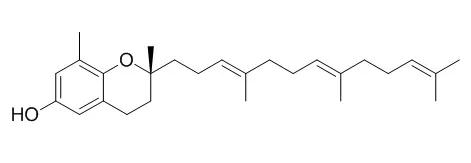| Kinase Assay: |
| Biochem Pharmacol. 2008 Aug 1;76(3):330-9. | | Tumor anti-angiogenic effect and mechanism of action of delta-tocotrienol.[Pubmed: 18599020 ] | Anti-angiogenic therapy mediated by drugs and food components is an established strategy for cancer prevention. Our previous cell-culture studies identified a food-derived anti-angiogenic compound, tocotrienol (T3, an unsaturated vitamin E), as a potential angiogenic inhibitor. Among T3 isomers, Delta-Tocotrienol is considered as the most potent compound. The purpose of this study was therefore to evaluate the inhibitory effect of Delta-Tocotrienol on tumor angiogenesis.
METHODS AND RESULTS:
As growth factors (e.g., vascular endothelial growth factor and fibroblast growth factor) play critical roles in tumor angiogenesis, a conditioned medium rich in these growth factors from human colorectal adenocarcinoma cells (DLD-1-CM) was used as an angiogenic stimulus. Delta-Tocotrienol (2.5-5 microM) significantly suppressed DLD-1-CM-induced tube formation, migration, and adhesion on human umbilical vein endothelial cells. These effects were partly associated with reactive oxygen species generation by Delta-Tocotrienol . Western blot analysis revealed that the anti-angiogenic effect of Delta-Tocotrienol is attributable to regulation of growth factor-dependent phosphatidylinositol-3 kinase (PI3K)/phosphoinositide-dependent protein kinase (PDK)/Akt signaling as well as to induction stress response in endothelial cells. Moreover, we conducted an in vivo mouse Matrigel plug angiogenesis assay, and found that Delta-Tocotrienol (10-20 microg) exhibits dose-dependent inhibition of DLD-1-induced vessel formation.
CONCLUSIONS:
These results suggest that T3 has potential use as a therapeutic dietary supplement for minimizing tumor angiogenesis. | | Int J Cancer. 2012 Dec 1;131(11):2668-77. | | Delta-tocotrienol suppresses Notch-1 pathway by upregulating miR-34a in nonsmall cell lung cancer cells.[Pubmed: 22438124 ] | MicroRNAs (miRNAs) are small noncoding RNAs that play critical roles in regulating various cellular functions by transcriptional silencing. miRNAs can function as either oncogenes or tumor suppressors (oncomirs), depending on cancer types.
METHODS AND RESULTS:
In our study, using miRNA microarray, we observed that downregulation of the Notch-1 pathway, by Delta-Tocotrienol, correlated with upregulation of miR-34a, in nonsmall cell lung cancer cells (NSCLC). Moreover, re-expression of miR-34a by transfection in NSCLC cells resulted in inhibition of cell growth and invasiveness, induction of apoptosis and enhanced p53 activity. Furthermore, cellular mechanism studies revealed that induction of miR-34a decreased the expression of Notch-1 and its downstream targets including Hes-1, Cyclin D1, Survivin and Bcl-2.
CONCLUSIONS:
Our findings suggest that Delta-Tocotrienol is a nontoxic activator of mir-34a which can inhibit NSCLC cell proliferation, induce apoptosis and inhibit invasion, and thus offering a potential starting point for the design of novel anticancer agents. |
|






 Cell. 2018 Jan 11;172(1-2):249-261.e12. doi: 10.1016/j.cell.2017.12.019.IF=36.216(2019)
Cell. 2018 Jan 11;172(1-2):249-261.e12. doi: 10.1016/j.cell.2017.12.019.IF=36.216(2019) Cell Metab. 2020 Mar 3;31(3):534-548.e5. doi: 10.1016/j.cmet.2020.01.002.IF=22.415(2019)
Cell Metab. 2020 Mar 3;31(3):534-548.e5. doi: 10.1016/j.cmet.2020.01.002.IF=22.415(2019) Mol Cell. 2017 Nov 16;68(4):673-685.e6. doi: 10.1016/j.molcel.2017.10.022.IF=14.548(2019)
Mol Cell. 2017 Nov 16;68(4):673-685.e6. doi: 10.1016/j.molcel.2017.10.022.IF=14.548(2019)